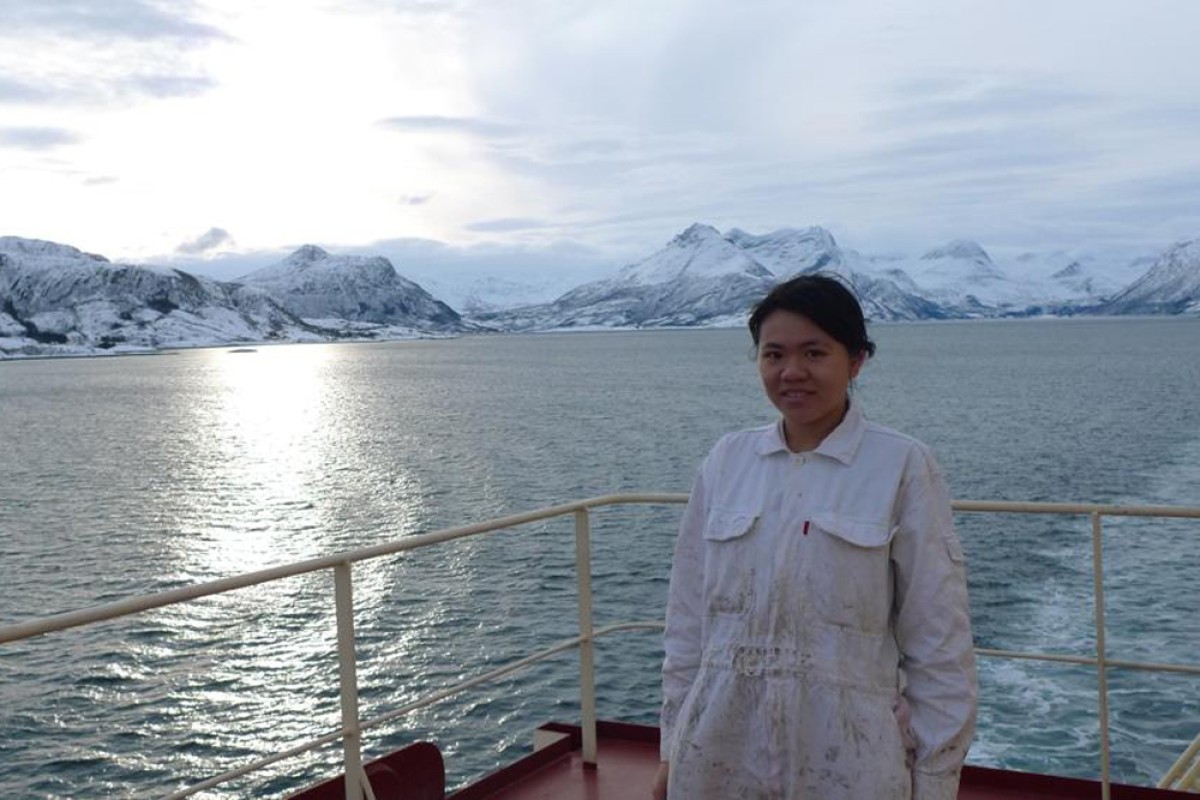
A seafaring woman: mechanical engineer Joanna Kwok on dealing with seasickness, sexism, and sailing around the world
Sailing the oceans, with only birds, fish and stars as far as the eye can see, may sound romantic – but it’s a different story once you make a career at sea
 As second engineer on board a ship, Joanna Kwok has to keep heavy machinery running smoothly, but she also gets to travel the world and enjoy spectacular scenery.
As second engineer on board a ship, Joanna Kwok has to keep heavy machinery running smoothly, but she also gets to travel the world and enjoy spectacular scenery.Joanna Kwok doesn’t seem suited to a job at sea: she gets severe motion sickness and even a ride on a Star Ferry, or a bus from Hong Kong Island to Tuen Mun, gives her a hard time. She doesn’t like spicy food, but as many of her colleagues are from India, curry has become her daily staple.
“I didn’t know what I’d be getting into,” she recalls.
Eight years into the trade, Kwok now works as second engineer on a ship and is on her way to become a chief engineer – the equivalent of a captain.
Graduating from a girls’ school, Kwok became one of only two girls in her mechanical engineering class at the Hong Kong Institute of Vocational Education. She didn’t like the idea of a desk job, but she didn’t plan for a marine job either.
It was a career talk that changed her path. The perks of being a seafarer were brought up. “Travel the world and get good pay were all I heard,” Kwok remembers. It would still be mechanical engineering. How difficult and different could it be? “Also, it was only a half-year contract. If I hated it, I could just come back and move on,” she told Young Post.
During her first month on board, she threw up so badly that she barely kept any food down for a couple of days.
“Whoever told me it wouldn’t be that bad, because bigger ships are more stable, was lying,” she says. Even if the ship is bigger, there are always bigger waves, and that’s part of the job you can’t get away from.
The Atlantic Ocean in winter is the worst, and it was a nightmare to sail from Europe to North America. Influenced by the currents, waves are extremely high and can rock the ship to an angle of 35 degrees.
“It’s a challenge to go to bed and stay put,” she says. The seamen would come up with different ways to stop themselves rolling out of bed. One of Kwok’s colleagues put a suitcase on the side of his bed, in the hope that it could block him, but it kept rolling away. Kwok tried to build a fortress of bedding and pillows, which was not much use either. For as long as two weeks, she was lucky to get any sleep in the night.
Kwok has sailed on vessels such as bulk carriers, containers, general cargo ships and oil tankers. Her job is to attend to any emergencies or breakdowns onboard, in addition to maintaining the machinery.
Being a seafarer is not a “normal job”. You don’t get weekends, but you don’t need to work year-round either. In fact, Kwok says she has been at work at sea for less than half of the past eight years.
“Basically the more vacations you take, the less pay you get,” she says.
She has worked on around nine ships, and takes time out to study and take exams for certificates, which is the way to advance in the job hierarchy. With every exam passed and certificate obtained, the marine engineer moves up a rank – from cadet to junior, fourth, third, second, and finally chief engineer.
“Women get promoted more slowly,” she says. “I had to wait longer to sit the exams. In a male-dominated industry, it’s natural for people to be dubious about what women are capable of.”
Every gender has its own advantages and disadvantages. Women might be weaker in strength, but it’s more about mental work than physical.
“Many devices are electronic now and many tasks need teamwork. Even though I’m a bit short of strength, I can count on my team … and sometimes if we need to reach something, my smaller hands might make it easier.”
Being in management as a second engineer, Kwok says her job now involves more planning and problem solving, which can make use of the female strengths of being attentive and considerate.
As the only woman on the ship, Kwok is glad that changing times have allowed her the chance of a career at sea, even though not every company is willing to take on women seafarers.
“In the old days, women had no possibility of getting on board,” she says.
She remembers her first job, when older seamen would say behind her back that a ship was destined to sink if there was a woman on board. Eight years later, she still gets questions like “You’re not the wife [of a seaman]? You’re actually here for the job?” but she has got used to it.
“There will always be people who hate the idea of women entering a male-dominated industry, but the industry has become more and more open towards it,” she says.
The attitude towards women isn’t the only thing that has changed over time.
Before joining a ship, Kwok had to take four mandatory courses – first aid, firefighting, personal survival and survival craft – to get her seaman’s book. “It’s all ‘safety first’ after the Titanic tragedy more than 100 years ago,” she says.
That shipwreck was the event that revealed all the loopholes, including too few lifeboats, and a protocol has since been established that every vessel needs to have lifeboats for its full capacity.
Sailing is not an easy job, nor the safest job, but it comes with its own charm. Working on vessels, Kwok has travelled the world, from secluded beaches in Brazil to remote villages at the foot of snow-covered mountains in Norway.
Every time the ship drops anchor somewhere, she takes the limited time to shop, go sightseeing and enjoy food which isn’t curry.
“It varies [how often the ships are moored, and for how long],” Kwok says. “Sometimes it only moors for three hours, but it can go up to ten days.”
The longest consecutive time she has spent at sea was more than two months, but that was not the worst experience. “It was really miserable when we dropped anchor near land. We could see the lights and houses on the bank but we just couldn’t get near,” she says of one time they had to wait a month in line to enter a port.
When at sea, she is able to take in all of nature’s beauty.
Sunsets over the sea are breathtaking. “Every sunset is different… and a starry night is the most fascinating. Especially when we sailed in the southern hemisphere, the Milky Way was so clear above us,” Kwok says.
When she has spare time on board, besides placing a weekly phone call to her family – at a cost of HK$4 per minute – Kwok likes to binge-watch TV shows, all downloaded when she’s at home.
There is barely any internet connection on the ship. Even if the ship owner has wi-fi set up, it is shared with everyone on board, and it can take up to an hour to send an image by Whatsapp.
The weak internet service is used to its maximum when someone on board gets sick. Captains and chief officers are equipped with basic medical knowledge, but there are times they need to email – through a satellite – an offshore medical team, detailing the patient’s symptoms and the medication on board and wait for further instructions.
“But for me, I almost never get sick on board. It doesn’t kick in until I’m back home,” says Kwok.
To celebrate International Women’s Day, Kwok will give a talk at the Hong Kong Maritime Museum at 6.30pm tomorrow entitled: “Women at Sea: Conversations with Women Seafarers”.
